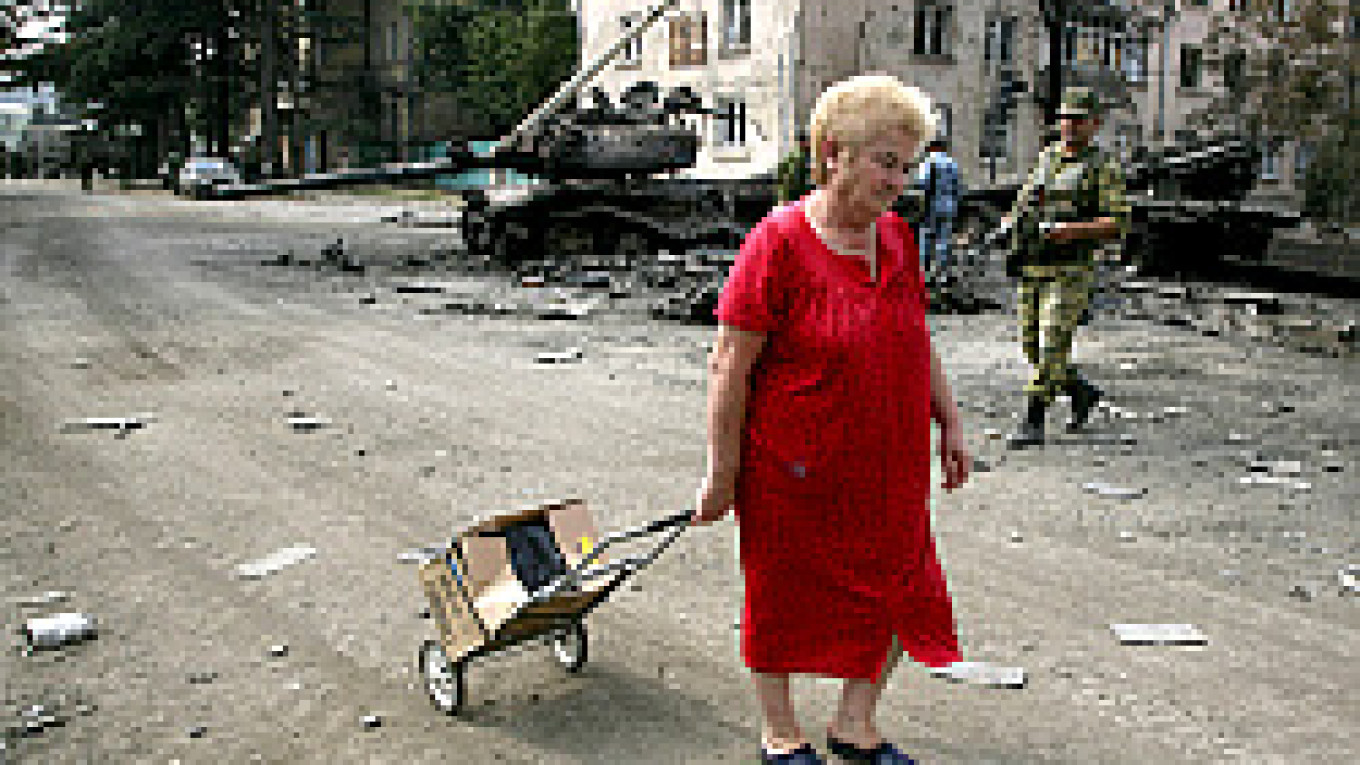During a visit Tuesday arranged by the Russian government, journalists were escorted into the city aboard armored vehicles.
Reporters witnessed more than a dozen fires in what appeared to be deserted ethnic Georgian neighborhoods and saw evidence of looting in those areas.
The heaviest damage from the recent fighting appeared to be around Tskhinvali's government center. More than a dozen buildings in the area were little more than scorched shells.
Several residential areas seemed to have little damage, except for shattered windows, perhaps from bomb concussions.
Near the city center, pieces of tanks lay in a heap near a bomb crater. The turret of one tank was blown into the front of the printing school across the street. A severed foot lay on the sidewalk nearby.
Salima Grapova, a 41-year-old music teacher, pointed to the blast damage at the intersection, which is one of the hardest-hit spots. A theater, typesetting school and an apartment house were heavily damaged or destroyed.
"Here, every rock had blood on it," she said of the fierce fighting.
Asked why her neighborhood had suffered, she noted that the train station and other government targets were nearby.
Outside town, dozens of houses burned along the main road. A Russian officer said some of the buildings had been burning for days and others were damaged the previous night during an airstrike by a single Georgian plane.
When an AP photographer rode through the same villages Monday morning, none of the houses was burning. The fires only began Monday night, more than 24 hours after the battle for the city was over.
Army Colonel Igor Kononenko showed off a civilian neighborhood, once part of the old Jewish quarter, that sustained extensive damage. He said that was proof the Georgians targeted civilians.
"This street is very small, tanks can't go through here," he said, arguing there was no military reason for the Georgian military to shell the neighborhood.
However, the district stands on a hillside in the line of fire between Georgian rocket position and Tskhinvali's government center, located around the university. Some civilians in the area conceded that Georgian fire at the government building might have fallen short.
At the regional hospital, doctors said the patients were moved to the basement during Georgia's bombardment of the city and had to do without light, water or toilets. The dungeon-like rooms still stank of sewage Tuesday, while sheets and bandages were stained with blood.
Dr. Tina Zhakarova, who said the hospital had treated 224 patients during the fighting, called the Georgian assault on the city an act of ethnic cleansing.
Noting that the medical facility had been damaged, she held out a handful of shrapnel to reporters. Doctors can protect people from disease, she said. "How can we protect them against this?"
But from the outside, the hospital appeared to have only light damage, either from bullets or shrapnel. Most of the windows were shattered.
A Message from The Moscow Times:
Dear readers,
We are facing unprecedented challenges. Russia's Prosecutor General's Office has designated The Moscow Times as an "undesirable" organization, criminalizing our work and putting our staff at risk of prosecution. This follows our earlier unjust labeling as a "foreign agent."
These actions are direct attempts to silence independent journalism in Russia. The authorities claim our work "discredits the decisions of the Russian leadership." We see things differently: we strive to provide accurate, unbiased reporting on Russia.
We, the journalists of The Moscow Times, refuse to be silenced. But to continue our work, we need your help.
Your support, no matter how small, makes a world of difference. If you can, please support us monthly starting from just $2. It's quick to set up, and every contribution makes a significant impact.
By supporting The Moscow Times, you're defending open, independent journalism in the face of repression. Thank you for standing with us.
Remind me later.


